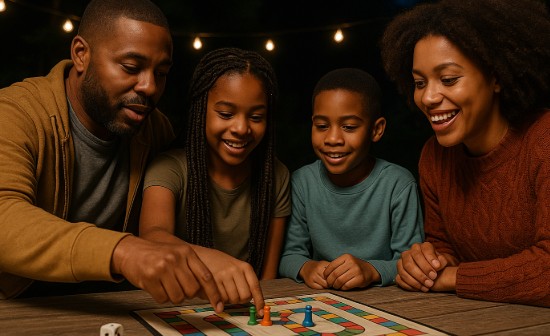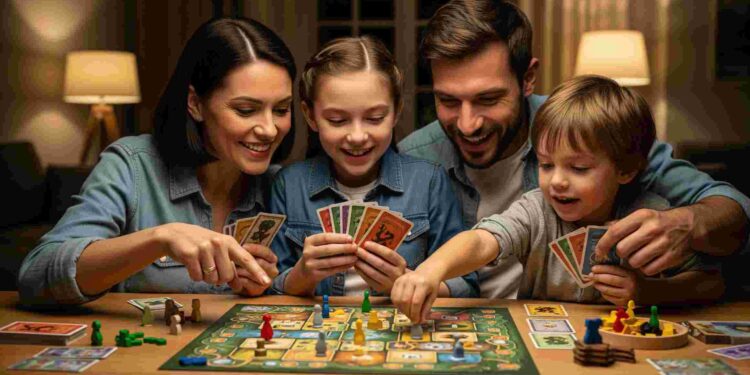In an age where digital devices often distract more than they connect, carving out quality time with family has never been more essential—or more challenging. The cherished tradition of family game night offers a rare opportunity to unplug, sit down together, and share in laughter, stories, and friendly competition.
But as many families have discovered, not all games are created equal when it comes to creating a harmonious evening. Enter cooperative board games: a genre that is transforming the way we play by emphasizing teamwork over rivalry, and shared success over individual triumph.
Cooperative board games (or “co-op games”) are designed with one simple but powerful principle in mind—everyone plays on the same team. Rather than competing against one another, players work together to achieve a common objective. This collaborative format is not only engaging but especially well-suited to family dynamics, making it an ideal choice for game nights that prioritize bonding over winning.
Let’s explore in depth why cooperative board games are the perfect fit for family night, and how they can become a beloved part of your household routine.
Why Cooperative Board Games Are Perfect for Family Night
1. Shifting the Focus from Winning to Working Together
Traditional board games often rely on direct competition: one winner, several losers. While this can be thrilling, it can also lead to frustration, disappointment, and the occasional sibling meltdown—especially when young children are involved. Cooperative board games, on the other hand, eliminate the “me vs. you” mentality and replace it with “us vs. the game.”

This fundamental shift transforms the energy of family night. Instead of arguing over rules or sulking over losses, players are united by a shared goal.
Whether you’re defusing bombs, curing diseases, or rescuing animals, the experience becomes less about outsmarting each other and more about supporting each other. The focus moves away from competition and toward connection.
2. Building Communication and Critical Thinking Skills
One of the most valuable aspects of cooperative games is their emphasis on communication. Many of these games require open dialogue, active listening, and collaborative problem-solving—skills that are not only essential for success in the game, but also in real life.
For children, especially, this provides a natural and fun way to develop soft skills like negotiation, empathy, and teamwork. Parents and older siblings have the opportunity to model constructive communication and leadership while allowing younger players to contribute meaningfully to group decisions.
Take the game Forbidden Island, for example. Players must decide as a team which treasures to prioritize and how to allocate limited actions. The strategy is only effective when everyone voices their ideas and agrees on a plan. These are powerful, teachable moments wrapped in the guise of play.
3. Inclusive and Accessible for All Ages

Finding a game that works for a wide range of ages and abilities can be one of the biggest hurdles in organizing a successful family game night. Competitive games can often skew either too simple for adults or too complex for kids. Cooperative games, however, tend to include flexible difficulty levels and mechanics that scale with the group’s experience.
Many titles, like Outfoxed! and Zombie Kidz Evolution, are specifically designed for younger players but still provide fun and engagement for parents. Others, such as The Crew or Mysterium, appeal to older kids and adults while still allowing for guided participation from younger family members. Because the goal is shared, more experienced players can help newer or younger ones without it feeling patronizing or like an unfair advantage.
This creates an atmosphere of encouragement, where everyone feels included and valued, regardless of age or skill level.
4. Reducing Conflict, Increasing Fun
Let’s be honest—competitive games, especially with kids, can sometimes lead to squabbles, hurt feelings, or gloating. That’s not to say competition doesn’t have its place, but for many families, especially those with sensitive or younger children, the emotional stakes can get too high.

Cooperative games offer a refreshing alternative. Since everyone is either winning or losing together, there’s no singling out of “best” or “worst” players. Setbacks become opportunities for the group to regroup and improve strategy rather than sources of blame. Victory is sweeter when it’s shared, and failure feels less personal when it’s collective.
This approach not only diffuses potential conflict but also encourages a more relaxed, joyful atmosphere—one where the emphasis is on the experience rather than the outcome.
5. Crafting Memorable Shared Experiences
Perhaps the most magical aspect of cooperative board games is their ability to create narratives and memories. These games are often story-driven, with evolving challenges, characters, and scenarios that engage the imagination. A night spent trying to escape from a cursed temple or racing to save the planet from alien invaders can feel like a mini family adventure.
These shared stories become part of your family lore: “Remember the time we all almost drowned in Forbidden Desert but Mom saved us with the last water token?” or “We had one card left in The Crew, and you pulled it off perfectly!” These aren’t just games—they’re bonding experiences that families cherish and talk about long after the box is closed.
Also Read: Best Cooperative Games for Two Players
A Few Must-Try Cooperative Games for Family Night
If you’re ready to bring cooperative gameplay into your home, here are some top-rated titles to consider for different age groups and experience levels:
- Outfoxed! (Ages 5+): A light deduction game where players work together to solve a mystery before the culprit escapes.
- Zombie Kidz Evolution (Ages 7+): A legacy-style game with evolving rules and rewards that’s perfect for kids and families.
- Forbidden Island (Ages 8+): Players must work together to recover treasures from a sinking island.
- The Crew (Ages 10+): A trick-taking game set in space that requires silent coordination and grows more challenging with each mission.
- Mysterium (Ages 10+): A ghost gives clues through images while players try to solve a murder mystery together.
- Pandemic (Ages 12+): A global classic where players collaborate to stop the outbreak of deadly diseases across the world.
Conclusion: Reimagining Game Night
In a world where personal devices often pull families in different directions, cooperative board games bring people back to the same table, focused on a common goal. They offer a safe, inclusive, and engaging way to spend time together while cultivating skills like communication, empathy, and teamwork.
Whether your family is navigating magical lands, solving ancient mysteries, or saving the world from disaster, you’ll be doing it side-by-side—learning, laughing, and growing together. So the next time you plan a family game night, consider choosing a cooperative adventure. After all, in both games and in life, the best moments are the ones we share.










